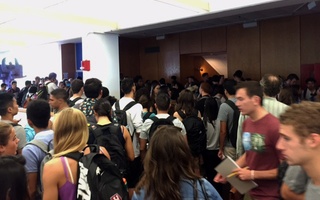UPDATED: September 18. 2014, at 2:00 p.m.
Five years ago, College students carried 800-page books listing every single course offered at Harvard. But in 2009, the College did away with printed course catalogs, lightening backpacks and permanently changing the way students pick their classes.
For most students, that meant turning to homespun browsing tools—like courses.cs50.net, a site created by students in Computer Science 50: “Introduction to Computer Science”—and away from the College’s own, less sleek browser.
But a revamped course catalog set to roll out in the fall of 2015 may change that focus. The catalog—part of a larger effort to create a student platform to centralize bill payment, course enrollment, and registration at the University—is intended to personalize a student’s browsing experience by noting which courses count toward his or her degree progress, according to Faculty of Arts and Sciences Registrar Michael P. Burke.
“This semester we’ll be ramping up with more interactions with faculty and students, to make sure that the way that students experience the catalog is a richer, more robust experience than what we offer now,” Burke said, noting that the catalog will feature keyword searches and more useful filters.
With the rollout of the course catalog next fall, University administrators hope to spur students to reflect on their educational goals when searching for courses online, even as some professors worry that more targeted search tools will limit students’ opportunities to explore.
Though the College still officially offers its own online browsing tool for searching the catalog, many students say they prefer using the CS50 tool, which filters courses by concentration and meeting time, in addition to showing data from the Q guide.
“[The CS50 tool] is without a doubt way easier to use,” Cynthia S. Meng ’15 said. “The user interface is so much more intuitive, and it’s also a good way to aggregate all the data I actually want to see in one place.”
Unlike the CS50 tool, Harvard’s current catalog browser—found at coursecatalog.harvard.edu—features only a simple search bar, making it difficult to search for courses by department or General Education requirement. Students can type the desired course title, description, and instructor into the search bar, or leave it blank, to receive a long list of courses offered by all of Harvard’s schools.
{shortcode-4134ab448683716d342067c87407197dac5451db}
“[The catalog] is an html page, it starts by department and you drill down into it,” Burke said. “It’s just a long page…. It goes down forever.”
Anastasiya Borys ’15 said that prior to this academic year, she had primarily used the CS50 course tool as her way to find suitable classes, but this year switched to using the course catalog’s website so she could search for non-College courses not included on the CS50 site.
“The course catalog is less user-friendly and you have to almost come into it knowing what you're looking for,” Borys said.
In addition, the catalog is so decentralized that students often find themselves searching for courses and registering on multiple platforms, according to Jason Shaffner ’99, a director of student information systems for Harvard University Information and Technology.
“It’s a more fragmented experience,” said Shaffner, who is charged with overseeing the implementation of the new student information system. “Students have to use multiple course catalog interfaces today to be able to plan what they’re going to take and then to complete the study card.”
Read more in College News
For Many UC Hopefuls, Humor Is a TouchstoneRecommended Articles
-
Courses of Instruction For 1996-97 ReleasedThe Faculty of Arts and Sciences officially unveiled its 1996-97 guide to courses last week, with a cover that is
-
The CS50 ModelCS50 is not a fluke. The methods that turned the course into an academic juggernaut with top Q ratings and astronomical enrollment figures—in spite of ostensibly abstruse subject matter and an infamously taxing workload—can be applied across the Harvard curriculum.
-
CS 50 Office Hours To Move To AnnenbergStarting this semester, Computer Science 50: “Introduction to Computer Science I” office hours will be held in Annenberg to facilitate interaction between students and the course staff.
-
 Students Struggle With New My.Harvard While Shopping
Students Struggle With New My.Harvard While Shopping -
 Lassonde Will Stay on Campus To Teach
Lassonde Will Stay on Campus To Teach













